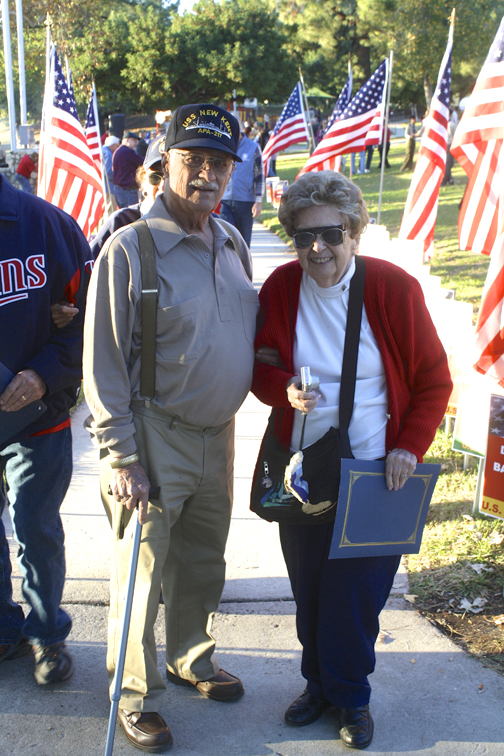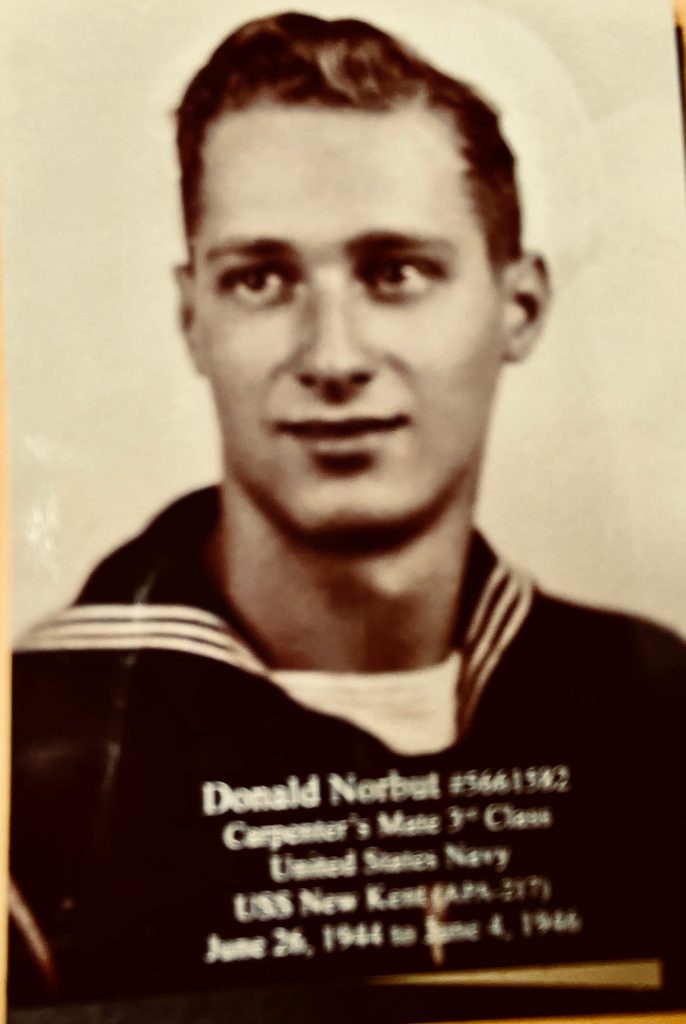

By Mary O’KEEFE
Local WWII veteran Don Norbut recalls his time in the U.S. Navy.
In observance of Veterans Day, CVW reached out to two World War II veterans to learn more about their service and to find out how they see the world today.
Don Norbut is a born-and-raised Angeleno. He moved with his family to La Crescenta decades ago and, at 94 years old, continues to be an active member of the community. He served in the Pacific in the U.S. Navy during WWII.
“In 1944, they were coming in and drafting kids right out of school,” Norbut said. “I was 17 and wanted to finish high school.”
He added that friends of his were being taken out of class and put into the military prior to graduating and he wanted to make sure that didn’t happen to him. So he went to the U.S. Navy recruiter and signed up.
“I made a deal. They could only come and get me after I graduated [from high school] and I would have turned 18,” he said. “I graduated on Friday, June 16 and, on June 27, they had [their hands on] my shoulder. On June 28 I was at boot camp in San Diego.”
He spent three months in basic training and requested to be trained as an aerial gunner. He and several others were approved to be aerial gunners.
“We were all lined up for the train,” he said of the train that would take them to aerial gunner training.
“I had my hand on the rail, ready to get on the train, and [the commanders] yelled at us to get off the train,” he said. “They told us we were going to be trained as landing craft personnel.”
So the men went to Coronado and trained for three months. They were told if they could land the amphibious craft on the beach in Coronado despite the rough waters there they could land anywhere.
“And they were right,” he added. “It was really rough.”
After training he took a 13-hour train ride to Oakland. He and his shipmates were then put on a merchant ship.
“That was on Christmas Eve,” he said.
Norbut did not have a lot of positive feelings toward U.S. Navy food. His shipmates also did not have a lot of luck with the dining options. To this day, Chicken a la King conjures up some pretty nauseous memories for Norbut.
They sailed to Pearl Harbor in Hawaii for more training, this time with the U.S. Army. He recalled when they were told to get to a meeting area to set sail again.
“We were early but were told the ship had already sailed and we had to come back [the next day],” he said.
That turned out to be a lucky thing because the ship they had missed ended up being sunk. But as ordered they showed up the next day and got onto the Navy destroyer USS Newcomb. Norbut spent the rest of his time in the Pacific and South Pacific.
He saw action and said he lost friends. One of his good friends died in the Philippines.
“We grew up together,” he recalled. Norbut had told his friend to join the U.S. Navy but his friend wanted to join the U.S. Army instead.
“He said, ‘No, I am going to join the Army.’ He was killed his first time out,” Norbut said.
On Easter morning 1945, April Fools’ Day, he was on a landing craft.
“The [destroyer] was bombing the shore and we were [moving toward the shore]. You could see and feel the bombs going over your head,” he said.
He added Japanese soldiers were in the hills waiting for the U.S. soldiers to land. He and his fellow soldiers stayed there, transporting soldiers and unloading merchant ships in open water, for several days.
He credits a Boy Scout master with giving him a life-saving gift.
“I was an Eagle Scout and I had a Boy Scout master who was [wonderful],” he said. The Boy Scout master had made special knives for each of the members of his troop who served in the war. He also gave them a silver dollar for luck.
“That knife saved my life,” he said.
Norbut was unloading a merchant ship when the net that held all the heavy equipment broke. He knew it was coming down, right on him, so he threw himself backward into the water. The equipment came crashing onto the area where he had been standing, breaking the railing. When Norbut went into the water he was wearing his helmet, his gun and a really heavy coat.
“I was sinking. I threw off my helmet … still sinking. I threw off my gun … still sinking,” he said. “I knew it was my jacket so I took out that knife and [cut myself out] of it. I then got back up.”
One of the main campaigns he was part of was the Battle of Okinawa. He watched Japanese aircraft leave Japan and “strafe” (attacking ground targets from the air) American ships. He was on a ship on its way to Japan when Japan surrendered.
At the end of the war he headed back home. Initially he was to dock in San Pedro, which would have been close to his home; however, Norbut’s commander wanted to go through the Panama Canal so he was discharged instead in Norfolk, Virginia. He then had to make it back home to LA.
Each of the sailors was given $300 to get home but Norbut decided to hitchhike instead and keep the cash. Along the way he saw the different ways soldiers were treated. Norfolk residents, Norbut said, were not always happy to see the sailors. However when he was hitchhiking through Illinois people driving by would stop and offer a place for him to stay, food and other support.
When he got home, he had a difficult time finding a job.
“[Employers] were supposed to hire those [returning] from the war … give them their jobs back,” he said.
He had worked as an upholsterer and his boss did give him his old job but then let him go weeks after re-hiring him. So he opened his own upholstery business, which he had for about five years. Then his cousin helped him get a job at a brewery and he began his 35-year career as a brewer. He worked for many companies but spent most of his time with Anheuser Busch and Pabst Blue Ribbon.
He met and married Esther, the love of his life, and they had two children. Looking back, he considers himself a lucky man.
In politics, he registered as a Democrat and his wife registered as a Republican.
“This way we figured we would get propaganda from both sides and we would settle [in the middle],” he said. “And that worked.”
He has grown grandchildren and said he does worry about the future.
“Climate change … I [worry] about how are [the government] is going to handle that,” he said. “I don’t see it as a rosy situation.”
Next week CVW will share another WWII veteran’s story.
